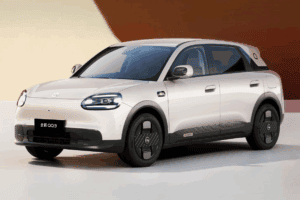Hybrid system offers seven driving modes and a new 1.6-litre engine combined with an 85 kW electric motor.

Named as one of the six models supposed to have debuted in 2023 as part of its Challenge 2025 product roll-out, Mitsubishi has officially taken the wraps off the hybrid version of the Xpander, simply called the Xpander HEV.
Small changes
A key model for Mitsubishi in South East Asia where sales have reportedly topped 500 000 units since production started in 2017, the HEV will be offered on both the standard Xpander and SUV-inspired Xpander Cross, produced exclusively at the three diamond’s Laem Chabang plant in Thailand.
ALSO READ: Mitsubishi Xpander worthy competitor in seven-seater segment
Externally, subtle changes differ the HEV from the normal Xpander, namely an HEV badge on the upper grille panel, a blue strip at the base of the skidplates, Hybrid EV badges on the front doors, blue accents at the base of the doors and on the wheels, an HEV badge on the bootlid and a special White Diamond colour as an alternative to the Jet Black Mica, Graphite Grey Metallic and Balde Silver Metallic hues.
Inside
Inside, the changes have been equally minor and largely carried over from when the regular Xpander received its first mid-life update three years ago.

This includes the steering wheel from the new Triton, a digital display and toggle switches for the climate control, restyled centre console with the electronic handbrake and Auto Hold buttons, a storage box that doubles up as a central armrest, and a wireless smartphone charger pad.
Unique to the hybrid though is the same gear lever as the Outlander SUV, a mode selector button and a fully digital eight-inch instrument cluster. Retained is the nine-inch infotainment system not offered on the Xpander sold in South Africa.
Petrol makes way for hybrid
The mentioned mode selector offering no less than seven modes; Normal, Tarmac, Wet, Gravel, Mud, Charge that uses the combustion engine to charge the battery and EV Priority that cuts the engine completely, the hybrid setup involves a 1.1-kWh lithium-ion battery pack driving an 85 kW electric motor paired to a new 1.6-litre petrol engine.

Somewhat surprisingly, no combined power outputs were revealed, with Mitsubishi opting to instead reveal individual outputs of the electrical system and the 1.6, which develops 70 kW on its own – five kilowatts less than the 1.5 that powers the conventional petrol Xpander.
Still front-wheel-drive, the amount of twist is directed to the ground via an electronic CVT that replaces both the five-speed manual, four-speed automatic and CVT offered on the standard Xpander.
On the cards?
Now on-sale in Thailand priced from 912 000 baht (R480 977), the Xpander HEV remains an uncertainty for South Africa in spite of the nameplate having been a surprise success since becoming available in 2021.
Should approval be given though, expect to possibly arrive later this year as Mitsubishi Motors South Africa’ first hybrid vehicle.
Additional information from: headlightmag.com and autolifethailand.tv.
NOW READ: Mitsubishi debuting six models in 2023 headlined by new Triton
Support Local Journalism
Add The Citizen as a Preferred Source on Google and follow us on Google News to see more of our trusted reporting in Google News and Top Stories.






